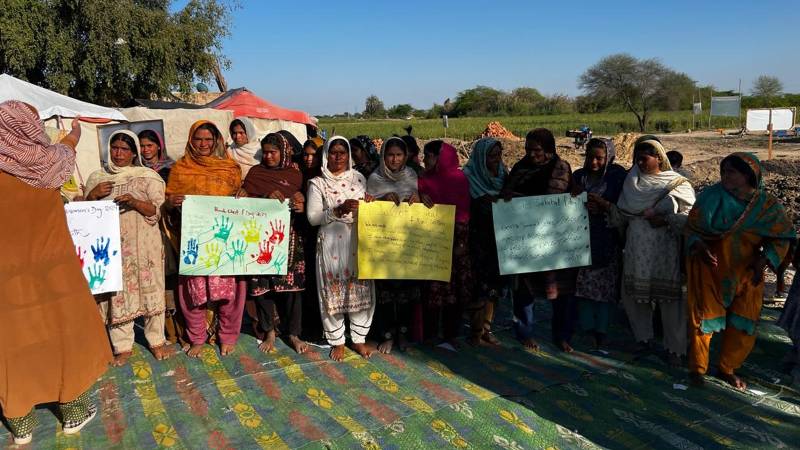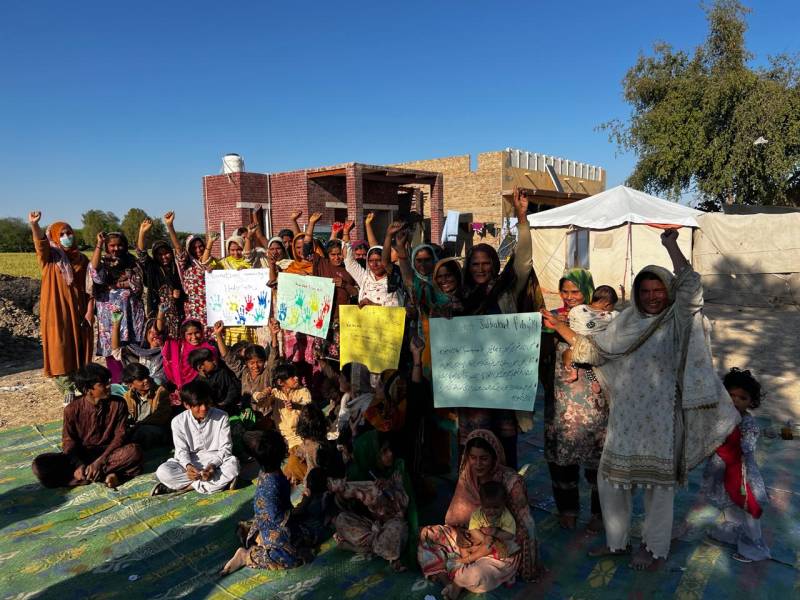
Women’s Day in Pakistan was celebrated in Islamabad, Lahore, Karachi and in Jaffrabad. 8th March, designated globally as a day to spotlight half the world’s population, remains anathema to most in Pakistan.
This year, my partner organization working on strengthening participatory, and I, decided to celebrate this auspicious day – however alien an Eid it may be – with the women and their families where we are rebuilding lives one home at a time. In Hindu Ghot, Jaffrabad, 20 families reside amongst Sher Dil Bhugti. In this hamlet of about 60 Pakistanis, I have been working with the women since the 2022 flooding had destroyed their lives.
Today, we began with a conversation around “What does it mean to be a woman?” The perplexed looks and furred foreheads were a clear sign they did not understand what I was asking. “Baji hum unpar hain hamay samaj nahi arahi hai, aap kya kehri hain.” “Aurat Khawateen Insaan – is say zida kya ho saktain hain hum?”
Outside of the identity of a daughter, sister, mother, wife, in law, what could they possibly be? Or is there something else?
The two days I spent in discussions, delving deeply, many times sitting silently just letting them think; a tectonic shift in their mind, heart and soul. To the worried looks I said with trepidation, “There is no need for any of you to answer this question to me, but do think and ponder over it in your own time.”
That first evening I thought: had I introduced too much of a radical thought process perhaps too soon? Was I suggesting or introducing an idea a truth even relevant to these women? What does it matter to those who are poor, not literate and vulnerable in every sense? Does it matter that we celebrate Women’s Day or believe women have equal rights when the living truth contradicts this idea?
These women have just recently begun to live under a proper solid home: having been permanently vulnerable from society and climate changes. Could talking about individual identity independent of the ‘family’ make sense at this stage of their social mobilization?

The next day, our partner OGDCL came to join our 8th March celebrations by breaking ground for 30 resilient disaster-risk-reduced homes. When the Executive Director of OGDCL and the head of the CSR asked some of the ladies “How do you feel?” I was thrilled to hear Rakhi Bibi, Shanti Bibi and Sita Bibi pipe, “We had never heard of Aurat din baji said it is our day and we have rights as independent woman, thank you for joining us in our day of celebrations.” Truth be told I can’t describe how I felt at that very moment.
There is no right time, there is no sequencing of introducing the knowledge to the millions of women in Pakistan that they exist and they matter, independent of who they are married to, birthed or from which family they were born into. In every corner of Pakistan, Aurat and Khawateen matter and must be celebrated for the lives they live and all the sacrifices they continue to bear without acknowledgement. There is an innate understanding as a human being, as a woman, that her choices are hers to make; in her hands her dreams and desires are legitimate. This message must be reiterated till it is accepted as the truth for all Pakistani women.
Today in 2024, Jaffrabad felt the power of 30 women and their children, as their menfolk watched from the sidelines – dancing and cheering their existence and celebrating their now in joy and hope.
Happy Aurat Day from Balochistan.

